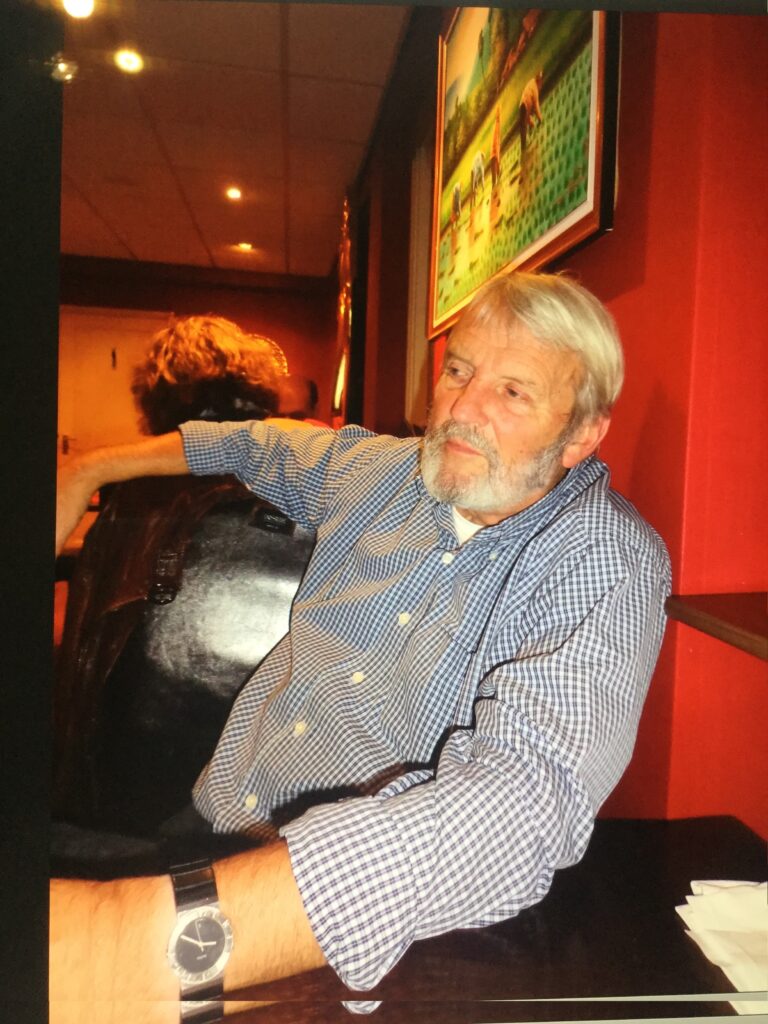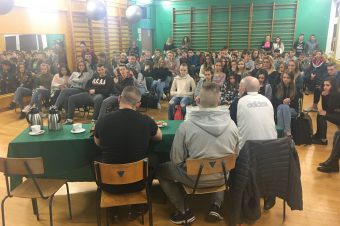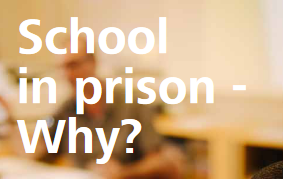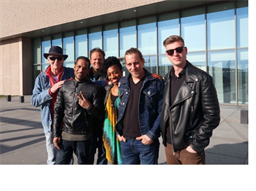By Sonia Kurten-Vartio (Finland) and Kevin Warner (Ireland)

Robert Suvaal, or ‘Rob’ as he often called himself, was a major international figure in the development of education in prisons. ‘Big’ is a word those who knew him readily use, and this refers to his strength of character and achievements as much as to his undoubted physical build – and it never surprised anyone that he was once a physical education teacher.
Robert was centrally involved in shaping the Council of Europe Recommendation and report of 1989, Education in Prison, in establishing and developing of the European Prison Education Association (EPEA), and in building a dynamic and comprehensive form of education in Dutch prisons from his Ministry of Justice office in The Hague. Later, after Dutch authorities unwisely abolished his vital coordinating position, he played an important role, between 2007 and 2011, advising prison services in such places as Ukraine and Kurdistan.
Robert’s engagement across national boundaries in the service of education in prison goes back many years. He contributed to a small but innovative international seminar in Reading, England, in 1978, which asserted the then unusual idea that there should be equality between education and work within prison regimes.
In the 1980s, he was a member of the Select Committee which formulated the Council of Europe report on education in prisons. His contribution to that process was enormous, insisting that an adult education approach was critical to such provision, as well as explaining the wider educational dimension of ‘physical education’, one of the key segments of ‘the wide curriculum’ – he would never accept the weaker term ‘PE’. One bleak January, early in the deliberations of that Council of Europe committee, he hosted a small sub-group of its members in his native Rotterdam and planned the overall shape of the report. Rob used to say proudly: “I’m from Rotterdam, the city of workers. When you buy a shirt in Rotterdam, the sleeves are already rolled up!”.
As many in the EPEA will know, the completion of Education in Prison in 1989 was the point at which the EPEA was conceived. Robert was a key player in helping the new organisation develop: he was one of the signatories of the invitation letter that went out after the Oxford conference in 1989. He was one of three who picked up the pace again, in Vancouver in 1990, to ensure that the EPEA did in fact get off the ground. Crucially, he was the lead organiser of the important EPEA conference that took place in Bergen, the Netherlands, in 1991, thereby giving much-needed momentum to the emergence of the new organisation. At that time, the Berlin Wall had not long fallen, and Robert was central to ensuring prison educators from Albania, Estonia, Hungary and Poland – countries previously cut off from ‘Western’ Europe – were able to participate in that gathering by the sand-dunes and sea.
Through the 1990s, as well as playing his part as a wise counsellor in the EPEA’s Steering Committee and the Board of the Correctional Education Association (CEA), Robert was a strong advocate for the kind of education set out in Education in Prison. He gave keynote addresses – for education as a right, for an adult education way of doing things and for ‘the wide curriculum’ – in places as diverse as Tallin in 1992, at several CEA conferences in North America, and at the EPEA conference in Budapest in 1997.
Yet, his practical support was as important as the ideas he promoted. From its initiation in 1991 and for some years after that, the EPEA Newsletter was a photocopied production. In those early years, once a Newsletter was produced, it was put on a ‘master copy’ by Robert in his office in the Ministry of Justice in the Netherlands and sent by post to the Liaison Persons in each country across Europe. Liaison Persons would then make photocopies in their colleges, prisons or Ministries and post a copy to each member within their country. This happened, of course, well before digital communication became common. The process generally worked well, and although the EPEA at that time was a very informal and simple operation, Robert would say ‘small is beautiful’ and had faith that it would grow.
Ten years after the EPEA conference in Bergen, Robert again played a key role in facilitating another conference in the Netherlands, in Noordwijkerhout in 2001: he ensured sponsorship and support from his colleagues in the Ministry of Justice, and participants fondly remembered that it would be Robert who gently chivvied stragglers at coffee break to move along and ensure workshops began on time – he valued punctuality. For Robert, conferences always had to be ‘working conferences’; he had an aversion to conferences where participation by many was just token. Typical of his work-ethic, that Noordwijkerhout conference left as a legacy a high-quality published report called Prison Education: A Multicoloured Palette?, edited by Robert, his Dutch colleague Joke Holdtgrefe and Sean Wynne from Ireland.
Robert put into practice the principles he so firmly believed in. Under his leadership, education in prisons in the Netherlands became one of the success stories in the field. Prison Education there became, to use the title of that report, ‘a multicoloured palette’, with good access for prisoners to varied and quality education, and with special national coordinating leadership in such fields as art education and library services. However, these national development roles, including Robert’s, were abolished and Robert moved into another area of education. The result was an enormous loss for people in prison and for prison education in the Netherlands. In time, education in Dutch prisons was greatly reduced, hollowed out and marginalized.
So, like the prophet unwanted in his own country, Robert shared his skills and wisdom in his later years in supporting prison services in other countries. He played a role in developing the prison and probation service in Ukraine from 2007 to 2009. He became a visiting expert to the Kurdistan area of Iraq as part of the EU-Just-Lex Training Mission in 2010 and 2011. However, the passing of his wife Irene, in 2014, was a great blow to him. They had been extraordinarily close. Some of us remember that when Robert would be abroad at conferences or other events, and in the days before easy communication, he would phone her every evening, wherever he was or whatever time-zone he was in. We feel that, when he lost Irene, he never really recovered from that. His own health also broke down.
It is the quality of the man that those who had dealings with him remember most. For both of us, he was a very good friend and a fine human being. Those who worked with him in the EPEA, the CEA and the Council of Europe speak very warmly of Robert. Torfinn Langelid (Norway) says he was “an enthusiastic man, full of wisdom and knowledge” and Svenolov Svensson (Sweden) noted how he was “a very supporting person”. Carolyn Eggleston, former President of the CEA and now also an honorary life-member of the EPEA, says, on her own behalf and that of her colleague and husband, Thom Gehring, that Robert was “a real asset in the field and enriched our lives”. Pam Bedford, the key person in ensuring that the EPEA was established at all, remembers “a person of high principles and integrity, most kind and compassionate – and great fun!”
That quality of fun is highlighted by many. Former EPEA Chairperson, Anita Wilson, says Robert “was a true gent, a wonderful person with a nice sense of humour”. She recalls him wearing a tee-shirt with pride with the slogan, ‘if you ain’t Dutch, you ain’t much!’ Sean Wynne, a former EPEA Secretary, likewise recalls “a BIG guy, with big booming voice to match, wearing his customary blue jeans and a tee-shirt usually adorned with an American slogan”. Noting how Robert battled against bureaucracy, Sean says “he fought for the teachers and the students… he was somebody one would love to have by one’s side ‘in the trenches’”.
Ian Benson was Chief Education Officer for prisons in England and a fellow member of the Council of Europe Select Committee in the 1980s. He recalls Robert as “a lovely man. He was tall and handsome but had the most gentle personality. He had a wonderful sense of fun and was also very thoughtful. He wasn’t garrulous but what he did say was always spot on… he was very modest and always sincere”.
Some three decades later, in other prison settings beyond Europe, it is striking that those Robert worked with speak of the same qualities in their “good friend and colleague”. He trained prison staff in Kurdistan, where Yousif Muksin Aulla said: “I feel sad loosing this great professor. I learned so much from him”. Muhammed Bakir, who worked with him as an interpreter in Kurdistan, said: “He was a great person to work with… he was a kind and caring person. May his great soul rest in peace”.





